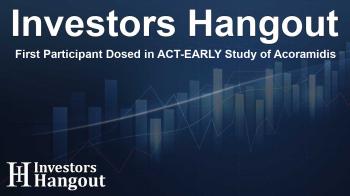First Participant Dosed in ACT-EARLY Study of Acoramidis

ACT-EARLY Marks a New Era in ATTR Prevention
The clinical landscape for transthyretin amyloidosis (ATTR) is evolving rapidly with the initiation of the ACT-EARLY study, which represents a pioneering attempt to prevent disease onset in at-risk individuals. This groundbreaking study by BridgeBio Pharma, Inc. is the first of its kind, focusing on asymptomatic carriers of pathogenic transthyretin (TTR) variants. By examining the preventive effects of acoramidis, a near-complete TTR stabilizer, the study seeks to determine if early intervention can alter the disease trajectory associated with ATTR.
Understanding ATTR and Its Implications
ATTR is a progressive and often fatal disease resulting from the abnormal accumulation of amyloid protein in the body's organs and tissues. It can manifest in various forms, including cardiomyopathy and polyneuropathy. Individuals with hereditary ATTR (hATTR) often face a dire prognosis, as the disease may present earlier and progress more aggressively than its wild-type counterpart. The goal of the ACT-EARLY study is to randomize approximately 600 participants, all of whom are asymptomatic carriers of pathogenic TTR variants. The primary analysis will evaluate the efficacy of acoramidis in delaying the development of symptoms associated with ATTR.
The Significance of Acoramidis
Acoramidis has been shown to significantly stabilize TTR, which may combat the onset of ATTR-related pathology. In earlier studies, including the Phase 3 ATTRibute-CM trial, acoramidis achieved notable success, including a reduction in all-cause mortality (ACM) and cardiovascular-related hospitalizations (CVH) among patients diagnosed with ATTR-CM. In the ACT-EARLY study, the primary efficacy endpoint will focus on the time until participants develop either ATTR-CM or ATTR-PN.
Collaborative Efforts to Address a Critical Need
In mitigating the challenges posed by ATTR, BridgeBio aims to foster partnerships with healthcare providers and patient advocacy organizations. This collaboration underscores the company's dedication to addressing the significant unmet needs of individuals at risk of developing this debilitating disorder. Dr. Adam Castaño, the Vice President of Global Clinical Development at BridgeBio, emphasizes the importance of this study for patients and caregivers worldwide, noting its potential to reshape how we approach the prevention of ATTR.
Potential Benefits for Participants
One of the most pressing issues within the current treatment landscape is the absence of preventive therapies for asymptomatic carriers. Currently, available therapies only target diagnosed patients, meaning many individuals who carry genetic variants remain vulnerable until symptoms manifest. Dr. Ahmad Masri explains that filling this gap in care could significantly benefit affected individuals, enabling earlier intervention that may yield substantial clinical advantages.
Safety and Efficacy of Acoramidis
Regarding safety, clinical trials of acoramidis reported mild adverse reactions, primarily gastrointestinal, which were manageable and did not result in high discontinuation rates. The ongoing nature of the ACT-EARLY study will allow researchers to gather comprehensive data regarding the safety, tolerability, and efficacy of acoramidis in a preventative setting. Assessing its impact on cardiac imaging parameters, plasma TTR concentration, and nerve function will be critical components of the ongoing research.
The Next Steps for ACT-EARLY Participants
With participation set to expand globally, the ACT-EARLY study is currently enrolling candidates. Individuals who meet eligibility criteria will have the opportunity to contribute to a study that may set new standards in ATTR preventative care. The aim is to offer testing and potential early intervention to those who carry TTR variants, effectively moving the field towards proactive management of this hereditary condition.
Frequently Asked Questions
What is the primary goal of the ACT-EARLY study?
The ACT-EARLY study aims to evaluate the efficacy of acoramidis in delaying or preventing the onset of ATTR in asymptomatic carriers of pathogenic TTR variants.
What are the main disease forms associated with ATTR?
ATTR can manifest as cardiomyopathy (ATTR-CM) and polyneuropathy (ATTR-PN), both of which have significant health implications.
How many participants are expected to enroll in the ACT-EARLY study?
Approximately 600 asymptomatic carriers of pathogenic TTR variants are projected to enroll in the study.
What is acoramidis used for?
Acoramidis is a selective TTR stabilizer developed to help manage the clinical implications of wild-type or variant transthyretin-mediated amyloidosis in patients.
What are the potential benefits of early intervention for asymptomatic carriers?
Early intervention may delay the onset of symptoms and improve long-term outcomes for carriers of pathogenic TTR variants, thus preventing a decline in health status.
About The Author
Contact Dominic Sanders privately here. Or send an email with ATTN: Dominic Sanders as the subject to contact@investorshangout.com.
About Investors Hangout
Investors Hangout is a leading online stock forum for financial discussion and learning, offering a wide range of free tools and resources. It draws in traders of all levels, who exchange market knowledge, investigate trading tactics, and keep an eye on industry developments in real time. Featuring financial articles, stock message boards, quotes, charts, company profiles, and live news updates. Through cooperative learning and a wealth of informational resources, it helps users from novices creating their first portfolios to experts honing their techniques. Join Investors Hangout today: https://investorshangout.com/
The content of this article is based on factual, publicly available information and does not represent legal, financial, or investment advice. Investors Hangout does not offer financial advice, and the author is not a licensed financial advisor. Consult a qualified advisor before making any financial or investment decisions based on this article. This article should not be considered advice to purchase, sell, or hold any securities or other investments. If any of the material provided here is inaccurate, please contact us for corrections.

